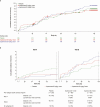Suptavumab for the Prevention of Medically Attended Respiratory Syncytial Virus Infection in Preterm Infants
- PMID: 32897368
- PMCID: PMC8653633
- DOI: 10.1093/cid/ciaa951
Suptavumab for the Prevention of Medically Attended Respiratory Syncytial Virus Infection in Preterm Infants
Abstract
Background: Respiratory syncytial virus (RSV) is a major cause of childhood medically attended respiratory infection (MARI).
Methods: We conducted a randomized, double-blind, placebo-controlled phase 3 trial in 1154 preterm infants of 1 or 2 doses of suptavumab, a human monoclonal antibody that can bind and block a conserved epitope on RSV A and B subtypes, for the prevention of RSV MARI. The primary endpoint was proportion of subjects with RSV-confirmed hospitalizations or outpatient lower respiratory tract infection (LRTI).
Results: There were no significant differences between primary endpoint rates (8.1%, placebo; 7.7%, 1-dose; 9.3%, 2-dose). Suptavumab prevented RSV A infections (relative risks, .38; 95% confidence interval [CI], .14-1.05 in the 1-dose group and .39 [95% CI, .14-1.07] in the 2-dose group; nominal significance of combined suptavumab group vs placebo; P = .0499), while increasing the rate of RSV B infections (relative risk 1.36 [95% CI, .73-2.56] in the 1-dose group and 1.69 [95% CI, .92-3.08] in the 2-dose group; nominal significance of combined suptavumab group vs placebo; P = .12). Sequenced RSV isolates demonstrated no suptavumab epitope changes in RSV A isolates, while all RSV B isolates had 2-amino acid substitution in the suptavumab epitope that led to loss of neutralization activity. Treatment emergent adverse events were balanced across treatment groups.
Conclusions: Suptavumab did not reduce overall RSV hospitalizations or outpatient LRTI because of a newly circulating mutant strain of RSV B. Genetic variation in circulating RSV strains will continue to challenge prevention efforts.
Clinical trials registration: NCT02325791.
Keywords: efficacy; infants; respiratory syncytial virus; safety.
© The Author(s) 2020. Published by Oxford University Press for the Infectious Diseases Society of America.
Figures



Comment in
-
How Viral Sequence Analysis May Guide Development of Respiratory Syncytial Virus Monoclonal Antibodies.Clin Infect Dis. 2021 Dec 6;73(11):e4409-e4410. doi: 10.1093/cid/ciaa944. Clin Infect Dis. 2021. PMID: 32640025 No abstract available.
Similar articles
-
Single-Dose Nirsevimab for Prevention of RSV in Preterm Infants.N Engl J Med. 2020 Jul 30;383(5):415-425. doi: 10.1056/NEJMoa1913556. N Engl J Med. 2020. PMID: 32726528 Clinical Trial.
-
Efficacy of motavizumab for the prevention of respiratory syncytial virus disease in healthy Native American infants: a phase 3 randomised double-blind placebo-controlled trial.Lancet Infect Dis. 2015 Dec;15(12):1398-408. doi: 10.1016/S1473-3099(15)00247-9. Epub 2015 Nov 4. Lancet Infect Dis. 2015. PMID: 26511956 Clinical Trial.
-
Palivizumab, a humanized respiratory syncytial virus monoclonal antibody, reduces hospitalization from respiratory syncytial virus infection in high-risk infants. The IMpact-RSV Study Group.Pediatrics. 1998 Sep;102(3 Pt 1):531-7. Pediatrics. 1998. PMID: 9738173 Clinical Trial.
-
Respiratory Syncytial Virus: Targeting the G Protein Provides a New Approach for an Old Problem.J Virol. 2018 Jan 17;92(3):e01302-17. doi: 10.1128/JVI.01302-17. Print 2018 Feb 1. J Virol. 2018. PMID: 29118126 Free PMC article. Review.
-
Respiratory syncytial virus disease: update on treatment and prevention.Expert Rev Anti Infect Ther. 2011 Jan;9(1):27-32. doi: 10.1586/eri.10.140. Expert Rev Anti Infect Ther. 2011. PMID: 21171875 Review.
Cited by
-
Implementing Personalized Medicine in COVID-19 in Andalusia: An Opportunity to Transform the Healthcare System.J Pers Med. 2021 May 26;11(6):475. doi: 10.3390/jpm11060475. J Pers Med. 2021. PMID: 34073493 Free PMC article. Review.
-
Inter and intra-host diversity of RSV in hematopoietic stem cell transplant adults with normal and delayed viral clearance.Virus Evol. 2023 Dec 28;10(1):vead086. doi: 10.1093/ve/vead086. eCollection 2024. Virus Evol. 2023. PMID: 38361816 Free PMC article.
-
The Quest for a Respiratory Syncytial Virus Vaccine for Older Adults: Thinking beyond the F Protein.Vaccines (Basel). 2023 Feb 7;11(2):382. doi: 10.3390/vaccines11020382. Vaccines (Basel). 2023. PMID: 36851260 Free PMC article. Review.
-
Reduced Respiratory Syncytial Virus Load, Symptoms, and Infections: A Human Challenge Trial of MVA-BN-RSV Vaccine.J Infect Dis. 2023 Oct 18;228(8):999-1011. doi: 10.1093/infdis/jiad108. J Infect Dis. 2023. PMID: 37079393 Free PMC article. Clinical Trial.
-
Current strategies and perspectives for active and passive immunization against Respiratory Syncytial Virus in childhood.J Pediatr (Rio J). 2023 Mar-Apr;99 Suppl 1(Suppl 1):S4-S11. doi: 10.1016/j.jped.2022.10.004. Epub 2022 Nov 17. J Pediatr (Rio J). 2023. PMID: 36402228 Free PMC article. Review.
References
-
- Mazur NI, Higgins D, Nunes MC, et al. ; Respiratory Syncytial Virus Network (ReSViNET) Foundation . The respiratory syncytial virus vaccine landscape: lessons from the graveyard and promising candidates. Lancet Infect Dis 2018; 18:e295–311. - PubMed
-
- IMpact-RSV. Palivizumab, a humanized respiratory syncytial virus monoclonal antibody, reduces hospitalization from respiratory syncytial virus infection in high-risk infants. Pediatrics 1998; 102:531–7. - PubMed
-
- American Academy of Pediatrics Committee on Infectious Diseases; American Academy of Pediatrics Bronchiolitis Guidelines Committee. Updated guidance for palivizumab prophylaxis among infants and young children at increased risk of hospitalization for respiratory syncytial virus infection. Pediatrics 2014; 134:e620–38. - PubMed
-
- Adis Insight. Suptavumab. Available at: https://adisinsight.springer.com/drugs/800040470. Accessed 5 March 2019.
Publication types
MeSH terms
Substances
Associated data
LinkOut - more resources
Full Text Sources
Other Literature Sources
Medical

